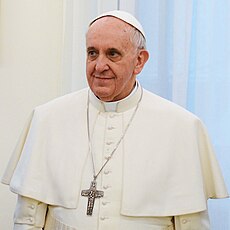 Well, I said you couldn’t tell much from one interview.
Well, I said you couldn’t tell much from one interview.
Last week, I posted about Pope Francis’s much discussed interview in an Italian Jesuit journal. I observed that the Pope seemed to be a mystic trying to place the Catholic Church outside politics–either progressive or conservative politics. He seemed to me to be advocating a radical Christian orthodoxy, a return to saving souls. Some of my friends told me I was mistaken. “There’s no getting the Church away from politics,” they said. What I perceived as introspection was really progressivism.
Pope Francis has now given another interview , this time to La Repubblica , and my friends are saying, “We told you so.” And I have to concede this new interview suggests Pope Francis is more of a straightforward progressive than I appreciated. Some things he said in the interview are a frankly a little shocking. He told the interviewer, Eugenio Scalfari, “Proselytism is solemn nonsense.” That’s a rather dismissive way to treat millennia of Christian apologetics. The pope’s views on conscience were also odd, from a Christian perspective. “Everyone has his own idea of good and evil and must choose to follow the good and fight evil as he conceives them,” the pope said. “That would be enough to make the world a better place.” With respect, “do what you think is right” is not the Christian view of conscience. That sounds more like Anthony Kennedy than St. Paul. And would the world really be a better place if everyone did what he thought was right? How about jihadis?
All this being said, I don’t think this second interview completely disproves my first assessment of Pope Francis. You have to put it in context. When you read the whole interview, you see how cleverly and gently Pope Francis is nudging Scalfari, a non-believer, to a Christian perspective. Combativeness is not necessarily the mark of piety. And I suspect future pronouncements will clear up some of the more questionable things the pope said. On proselytism, for example, Pope Francis this week gave a sermon in which he quoted his predecessor, Pope Benedict XVI, as saying that the Church doesn’t grow through “proselytism,” but “attraction” and “witness.” I believe this refers to Pope Benedict’s statement that the best testimonies for Christianity have been art and the lives of the saints. In other words, the Christian appeal is more about intuition than intellect. At least from my own Orthodox perspective, there doesn’t seem anything terribly wrong with that. I imagine Pope Francis will have more to say about conscience at some future time.
How about mysticism? It’s true that in the La Repubblica interview, the pope rather coyly denies being mystical (“What do you think?”). But that doesn’t prove he isn’t. Read his description of the great light that filled him as he contemplated whether to accept his election. Besides, would you really trust someone who told you he was a mystic? Such a declaration would pretty clearly show the speaker wasn’t a mystic.
Finally, it does seem Pope Francis’s politics are quite progressive, at least when it comes to economics, and that he wishes to emphasize that aspect of the Church’s social teaching rather than others, like sexual ethics. He talked about the worldwide economic crisis, said it was an urgent matter for the Church, and that he personally faulted unrestrained liberalism—that is, free market capitalism. He said the state might have to intervene in some circumstances to correct extreme inequalities.
The pope also said, however, more than once, that the Church should not deal in politics. Political institutions are “secular by definition” and operate in a sphere different from religion—all his recent predecessors had said so, he told Scalfari. Individual Catholics could engage in politics and carry their values with them. But the Church would “never go beyond its task of expressing and disseminating its values, at least as long as I’m here.” What the Pope seems to mean is that the Church as an institution should avoid getting involved in the workings of government and political parties, but that its prophetic role remains.
You can’t tell too much from two interviews, either. It will be interesting to see how all this develops. One thing hasn’t changed since the first interview, though. Pope Francis seems a remarkable and profound man with real spiritual charisma, a pastor. And he apparently answers letters.
You have a decision to make: double or nothing.
For this week only, a generous supporter has offered to fully match all new and increased donations to First Things up to $60,000.
In other words, your gift of $50 unlocks $100 for First Things, your gift of $100 unlocks $200, and so on, up to a total of $120,000. But if you don’t give, nothing.
So what will it be, dear reader: double, or nothing?
Make your year-end gift go twice as far for First Things by giving now.


